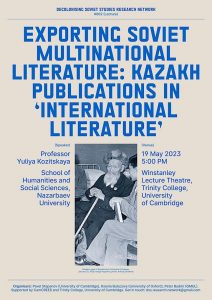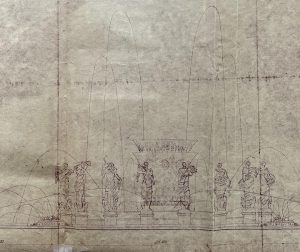Decolonising Soviet Studies (DSS)
CEREES Collaborative Research Network

Decolonising Soviet Studies (DSS) is a cross-institutional initiative formed by Petr Budrin (QMUL), Pavel Stepanov (Cambridge), and Ksenia Butuzova (Oxford). DSS organises interdisciplinary workshops, lectures, and events exploring how imperialism manifested itself in culture, ideology, and language in the Soviet Union. We invite established scholars and early career researchers from a variety of disciplines and regions of the former Soviet Union who are working to decolonise their national histories, identities, and cultures. We believe that this interdisciplinary and cross-cultural perspective is essential for understanding the complexities of the early Soviet period and its ongoing influence on the present.
Organisers:
Petr Budrin (QMUL), Ksenia Butuzova (University of Oxford), Pavel Stepanov (University of Cambridge).
Email: dss.research.network@gmail.com
Twitter: @dss_network
Events
DSS Second Lecture: Professor Yuliya Kozitskaya (Nazarbaev University)
Fri May 19 2023 at 05:00 pm to 08:00 pm

Yuliya Kozitskaya is an Assistant Professor at Nazarbayev University, School of Sciences and Humanities. She holds a Ph.D. in Philology and Linguistics from the Higher School of Economics (Moscow). Dr. Kozitskaya’s research interests include 20th-century literature, Soviet literary canon, Kazakh literature and theory of translation. In her dissertation, Dr. Kozitskaya studied the processes of formation of Kazakh Soviet literature in the 1930s, with the help of several case studies based on archival work, and analyzed the role that Moscow institutions, such as the Union of Soviet Writers and Soviet publishing houses, played in these processes. The research focused on the specifics of the status of the ‘Soviet national writer’ and showed the complexity of the relationship between Moscow as a center of the USSR and Kazakhstan. Now Dr. Kozitskaya is working on her first monograph about Kazakh literature of the 1930s.
The lecture will focus on English-language translations of Kazakh poetry texts and their publication in the English-language version of International Literature journal. The history of this journal is of particular interest because it used to be published in several languages and was the printed medium of the International Union of Revolutionary Writers . The original mission of the journal was to publish texts by left-wing writers. However, as time passed, the journal began to serve a different purpose, transmitting Soviet culture and ideology abroad. It thus became an original showcase of Soviet culture. Translations of the texts of Soviet Kazakh authors appeared in this journal in the late 1930s and 1940s. In her lecture, Yuliya will speak about the selection of Kazakh Soviet authors texts for publication in English, about who and how exactly translated them into English, and what goals these English-language translations pursued.
DSS Opening Lecture: Professor Nariman Skakov (Harvard University)
Soviet “Friendship of the Peoples” is the opening lecture of the Decolonising Soviet Studies Research Network
Wed, 8 Mar 2023 17:30 GMT

Nariman Skakov is an Associate Professor of Slavic Languages and Literature at Harvard University. His teaching and research interests lie primarily in 20th-century Russian/Soviet/Post-Soviet culture. More specifically, they include Early Soviet Avant-Garde, Modernism, Russian Formalism, Mikhail Bakhtin, Andrei Platonov, Soviet Orient, Moscow Conceptualism, Soviet and post-Soviet Cinema, and contemporary art.
He is currently working on a monograph titled Reorientalism: From Avant-Garde to National Form. Drawing upon extensive archival sources, it explores theoretical works, prose fiction, children’s books, film scripts, photo books, and documentary and feature films. The study attempts to bring into amplified visibility the new life of the Russian modernist tradition in the period which ostensibly repressed and decimated it.
Professor Skakov’s lecture is an opening event of Decolonising Soviet Studies (DSS) Research Network
‘Soviet “Friendship of the Peoples” as Management of Difference’
Paradoxically, the Stalinist vision of Soviet internationalism, articulated alongside the anti-cosmopolitan campaign of 1948–53, denied any form of external cultural influence in relation to Russian culture — the core of the Soviet state paradigm. It celebrated diversity while preserving essentialist “purity.” In a new post-1948 vision of the ethnic diversity of the Soviet state, the Russian national form prevailed, as it was conceived as a privileged form of particularity that had immediate access to the universal. This process resulted in the eventual homogenization of difference: other Soviet national forms, led by the Russian vanguard, aspired toward the eventual eradication of difference (and the emergence of universal proletarian culture). Instead of treating difference as difference, late Stalinist ideologues conceptualized difference as undergoing a gradual process of homogenization. Consequently, ethnic difference was rendered through the prism of ideological sameness. The paper traces the elevation of the “Russian national form” by examining multiple designs of the “Friendship of the Peoples” fountain, built in 1954 at the All-Union Agricultural Exhibition (later known as VDNKh).

Shape the Conversation
To join our mailing list, participate in our programme of events, or find out how we can support your research, please contact hss-cerees@qmul.ac.uk